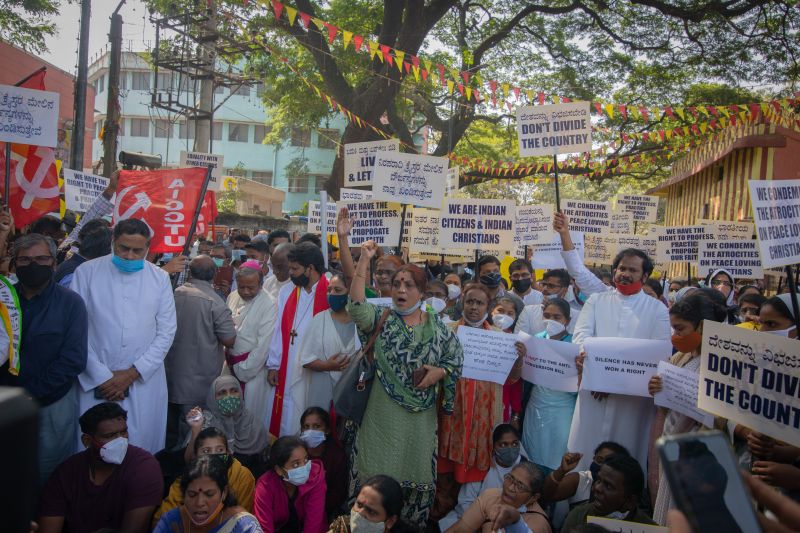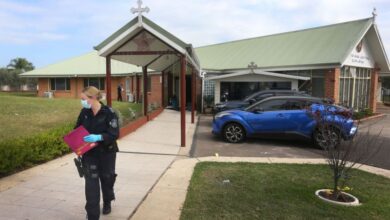Indian Supreme Court: Anti-conversion law may be ‘unconstitutional’

 Activists wave placards and chant slogans as they participate in a demonstration against the Protection of Right to Freedom of Religion Bill, also known as the Anti-Conversion Bill, on Dec. 22, 2021, in Bengaluru, India. / Credit: Abhishek Chinnappa/Getty Images
Activists wave placards and chant slogans as they participate in a demonstration against the Protection of Right to Freedom of Religion Bill, also known as the Anti-Conversion Bill, on Dec. 22, 2021, in Bengaluru, India. / Credit: Abhishek Chinnappa/Getty Images Bangalore, India, Jun 4, 2024 / 14:52 pm (CNA).
Catholics in India expressed optimism following the Supreme Court’s recent comments that a draconian anti-conversion law may be found to violate the Indian Constitution.
During a May 16 hearing concerning the anti-conversion law in northern Uttar Pradesh state, the Supreme Court noted that “some parts [of the law] may seem to be violative of the fundamental right to religion guaranteed under Article 25 of the Constitution.”
Supreme Court’s comments offer hope
“This Supreme Court observation gives us great hope,” Archbishop Peter Machado of Bangalore in southern Karnataka state told CNA.
“The court observation highlights the primacy of the fundamental right of freedom of conscience,” he said. “We do not support or indulge in fraudulent conversions. But the law should not be used to persecute us and deny our fundamental right.”
Twelve of India’s 28 states have criminalized religious conversions, including religious conversions that are voluntary and not forcibly coerced. The laws have led to the arrest of clergy and instigated acts of violence against Christians.
“The Supreme Court remark is a pleasant surprise and gives hope to us,” A.C. Michael, a Catholic and coordinator of the ecumenical United Christian Forum (UCF), told CNA. Appeals against the laws are pending in as many as nine states, Michael added.
UCF has been monitoring incidents of anti-Christian violence and extending support to persecuted Christians, most of whom were arrested on fraudulent conversion charges.
Michael pointed out that anti-conversion laws, which were enacted mostly by Hindu nationalist Bharatiya Janata Party (BJP) governments, are being abused to target Christians.
What did the Supreme Court say?
The Supreme Court made its observation while hearing a petition seeking the quashing of a conversion case registered against officials of Sam Higginbottom University of Agriculture, Technology, and Sciences (a Christian university) in Uttar Pradesh.
“The Supreme Court on Thursday orally commented that the Uttar Pradesh anti-conversion law [Uttar Pradesh Prohibition of Unlawful Conversion of Religion Act, 2021] in some parts may seem to be violative of the fundamental right to religion guaranteed under Article 25 of the Constitution,” the Institute of Legal and Management Studies reported.
Article 25 (1) of the Indian Constitution, which is known as the Magna Carta of religious freedom or “freedom of conscience” in India, guarantees: “Subject to public order, morality, and health and to the other provisions of this part, all persons are equally entitled to freedom of conscience and the right freely to profess, practice, and propagate religion.”
How are anti-conversion laws abused?
Of the 731 cases of incidents of atrocities the UCF recorded in 2023, Michael said, “more than half of them are questionable arrests under FORA [Freedom of Religious Acts].”
Michael pointed out that Uttar Pradesh — India’s most populous state (with a population of over 231 million), which is ruled by the Hindu nationalist BJP — has reported 301 of 731 incidents of anti-Christian persecution in 2023. He noted that most of these involved the blatant abuse of the anti-conversion law and that even senior Catholic priests have been arrested and imprisoned for weeks.
Father Babu Francis, social service director of Allahabad Diocese in Uttar Pradesh, was imprisoned for 83 days on an anti-conversion law charge. He was arrested after he went to police to enquire about the detention of his Catholic driver.
Father Dominic Pinto of Lucknow was arrested under the anti-conversion law in early February for allowing an evangelical group to hold a meeting at the Lucknow diocesan pastoral center. Pinto was released after six weeks while 10 others were released just before Easter.
“In almost all incidents reported across India, vigilante mobs comprising religious extremists have been seen to either barge into a prayer gathering or round up individuals that they believe are involved in forcible religious conversions,” the UCF reported.
“With impunity, such mobs criminally threaten and/or physically assault people in prayer before handing them over to the police on allegations of forcible conversions. Often communal sloganeering is witnessed outside police stations, where the police stand as mute spectators,” the report said.
“There is certainly a clear link between atrocities on Christians and anti-conversion laws,” pointed out Machado, whose petition demanding a curb on the steadily rising incidents are pending before the Supreme Court of India (in a different case).
The UCF has reported that while only 147 incidents of violence against Christians were reported in 2014 (when the BJP regime under Prime Minister Narendra Modi came to power), incidents have steadily increased since then, with 177 in 2015, 208 in 2016, 240 in 2017, 292 in 2018, 328 in 2019, 279 in 2020, 505 in 2021, 599 in 2022, and 731 in 2023.
“Even secular human rights groups have pointed out this link,” Machado said.
The People’s Union for Civil Liberties had released the study “Criminalizing Practice of Faith” documenting “how police colluded with Hindu nationalist groups and turned a blind eye to offenses committed against Christians” in southern Karnataka state, where the BJP government passed an anti-conversion law in 2022.
Anti-conversion laws proliferated at the state level after an attempt to pass a national law failed.
“The bid for a ‘national anti-conversion law’ was made in 1978 with a bill introduced by Om Prakash Tyagi, a Hindu nationalist member, in the national Parliament in 1978. … However, strong protests led to the rejection of this bill in Parliament,” said Father Mark Nediakalayil who had organized the biggest protest at Indore, in Madhya Pradesh.
“As the Hindu nationalists rose to power under the BJP, several states passed anti-conversion laws,” explained Nediakalayil, who led the Association of Catholic Enquiry Centers-India for two decades.





